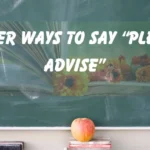While “Give you a heads-up” is widely used, it can feel too casual, vague, or even unprofessional in some settings. Whether you’re writing a work email, texting a coworker, or updating a client, using more clear, courteous, and professional alternatives enhances your tone and ensures your message is well received.
Learn how to say “Give You a Heads-Up” in more polished, versatile ways that fit every situation—from casual messages to formal business emails. This guide will help you find smart, natural ways to notify, inform, or warn someone respectfully—without sounding too abrupt or repetitive. Let’s explore expressions that elevate your communication across personal, formal, and business contexts.
Synonyms for “Give You a Heads-Up”
- Keep You Posted
- Let You Know
- Bring to Your Attention
- Make You Aware
- Pass Along a Message
- Notify You
- Tip You Off
- Alert You
- Warn You
- Update You
- Clue You In
- Fill You In
- Advise You
- Apprise You
- Forewarn You
- Signal You
- Cue You
Keep You Posted
To keep you posted means to continually share updates as things change or progress. It’s a conversational phrase that shows you’re committed to keeping someone informed and involved.
This phrase is especially useful in business, planning, or team projects—like when you say, “I’ll keep you posted on the deadline,” or “We’ll keep you posted if anything shifts.” It gives others a sense of reliability and attention.
Using this phrase reflects strong communication skills. It tells others they’re not just waiting in silence—you’ll be checking in and offering timely updates as needed.
Whether you’re talking to a client, colleague, or friend, saying “I’ll keep you posted” creates confidence. It signals that you’re thoughtful, attentive, and not leaving them out of the loop.
It’s a small phrase that goes a long way in building trust, connection, and professionalism, making people feel respected throughout the process.
Let You Know
To let you know is a simple but powerful phrase that signals your intent to share relevant information when the time is right. It’s casual, honest, and works across almost every type of interaction.
You might say, “I’ll let you know when I hear back,” or “Let me know if that works for you.” These phrases express both giving and receiving updates—helping to keep communication fluid and mutual.
The tone is friendly and direct, which makes this phrase perfect in text messages, informal emails, and even spoken conversations. It balances clarity with kindness.
Using this expression shows that you value the other person’s time and trust. You’re taking responsibility to reach out, rather than leaving them to guess or follow up.
In daily communication, “let you know” remains one of the most versatile, polite, and emotionally safe ways to express that you’ll keep someone informed without overwhelming them.
Bring to Your Attention
To bring to your attention means to carefully highlight something important, often because it requires action, thought, or awareness. This phrase is common in professional writing and formal discussions.
You might use it in an email: “I’d like to bring to your attention the following issue…” or “This is something I want to bring to your attention before the meeting.” It shows respect, concern, and precision.
This phrase is especially helpful when you need to point out errors, opportunities, or urgent matters. It signals that you’re approaching the topic with thoughtfulness and intention.
It’s not just about stating facts—it’s about framing them in a way that encourages the listener or reader to take them seriously and responsibly.
Using this phrase shows emotional intelligence. Rather than catching someone off guard, you’re gently guiding their focus, making it easier to handle situations with grace and clarity.
Make You Aware
To make you aware means to inform someone about something they may not know yet—but likely should know. It’s a balanced way to deliver information without sounding too forceful or alarmist.
Common in HR, health, legal, and service communications, you might hear, “We want to make you aware of this policy update,” or “I just wanted to make you aware of a scheduling change.” It feels neutral but considerate.
This phrase is great when you need to inform people of changes, risks, or reminders. It keeps the tone respectful and factual while still showing that the information is worth their attention.
By making someone aware, you’re not demanding a reaction—you’re simply offering knowledge. That knowledge, however, may be critical to their decision-making or comfort.
It’s a powerful phrase because it combines responsibility, care, and calm authority, making it easier to keep communication professional and trustworthy.
Pass Along a Message
To pass along a message means to act as a messenger—delivering words or information from one person to another, often when they can’t speak directly. It’s thoughtful and shows that you’re helping connect people across distance or time.
You might say, “Can you pass along a message to her?” or “I’m just passing along a quick note from your supervisor.” It’s useful in both informal settings and team environments.
This phrase communicates helpfulness. You’re taking the time to ensure that a message gets delivered, which shows consideration and cooperation.
Passing along messages helps bridge communication gaps—whether due to schedules, hierarchy, or logistics. It ensures that people don’t miss out on what’s important, even if it’s not face-to-face.
Using this phrase builds rapport. It shows that you’re responsible and trustworthy, someone who ensures that communication stays alive and flowing—even when others can’t speak directly.
Notify You
To notify you means to give you direct and timely information about something important. It could be a change in schedule, a new development, or any piece of news that needs to be shared clearly and promptly.
This phrase is commonly used in formal and professional settings, such as “We’ll notify you of the next steps” or “You’ll be notified once it’s complete.” It sets a tone of responsibility and respect for the other person’s awareness.
In customer service, HR, education, or business, being able to notify someone efficiently helps build trust and clarity. People appreciate knowing that they’ll be kept in the loop.
You can use this phrase to show intention and preparedness. When you say “I’ll notify you as soon as I hear back,” it reassures the listener that they’re not forgotten—they’re a priority in the process.
A simple notification, given at the right time, can prevent confusion and create a smoother experience, proving that communication is care.
Tip You Off
To tip you off means to give someone advance or insider information—usually about something important, surprising, or urgent. It’s often used when the information is not yet widely known, making it especially valuable.
This phrase carries an informal, sometimes secretive tone. It’s used when alerting someone before something happens, like “Just to tip you off, the boss is in a mood today,” or “She tipped me off about the early sale.”
Tipping someone off is a way of showing that you care enough to protect, warn, or prepare them, often before others find out. It reflects closeness, loyalty, or trust.
Use this phrase in storytelling, friendly conversations, or when you want to sound casual yet helpful. It suggests you’re giving someone a useful advantage or early insight.
It’s not just about sharing information—it’s about watching someone’s back and helping them stay one step ahead, especially in situations where time or knowledge matters.
Alert You
To alert you means to urgently inform someone about a situation that may require attention, action, or caution. It’s about signaling that something needs to be noticed or addressed right away.
This phrase is often used in emergencies, warnings, or important updates. You might hear “We’ll alert you if the system goes down,” or “You’ll be alerted when your order ships.”
It sets the expectation that the person will not be left unaware—they’ll be immediately informed as soon as something happens that affects them.
This phrase is practical and reliable. It’s ideal in tech, customer support, health, or logistics—any place where real-time updates or changes are expected.
By saying “I’ll alert you,” you show preparedness and responsibility. It communicates that you’re looking out for the other person and ensuring they won’t miss a critical detail.
Warn You
To warn you is to give a heads-up about something potentially risky, unpleasant, or urgent. It’s a protective gesture meant to help someone avoid harm, disappointment, or trouble.
Whether you’re saying “I just wanted to warn you about traffic” or “Let me warn you—this gets emotional,” the tone is usually serious, thoughtful, and caring.
Warnings help people prepare mentally, emotionally, or logistically. They’re often shared from a place of concern, insight, or prior experience.
You use this phrase when you feel someone may not realize what’s coming, and you want them to navigate the situation better with your help.
To warn someone isn’t negative—it’s a sign that you’re aware of their well-being and want to give them the tools or time to respond smartly and safely.
Learn More: Other Ways to Say “Dream Come True”
Update You
To update you means to keep someone informed as things change, develop, or move forward. It suggests that you’re taking responsibility for making sure they always have the most recent and relevant information.
This phrase is great in both casual and professional settings. For example: “I’ll update you as soon as I hear more,” or “Just updating you on the progress so far.”
Updates are about maintaining open communication and trust. When people feel updated, they feel included—and that’s vital in teamwork, relationships, or service-based interactions.
Use this phrase when you’re handling a situation where time, details, or actions may evolve. It shows that you are actively managing and monitoring whatever’s going on.
By promising to update someone, you’re telling them they’re not in the dark. It’s a powerful way to maintain connection, confidence, and clear expectations.
Clue You In
To clue you in means to provide someone with insight or understanding they previously lacked. It’s often informal, used when helping someone grasp what’s really going on or what they might’ve missed.
This phrase is helpful in personal, social, or casual professional settings. For example: “Let me clue you in on what happened at the meeting,” or “She clued me in on the real reason he left.”
It can carry a friendly or even playful tone, showing that you’re letting someone in on something they’ll benefit from knowing. It builds trust and strengthens informal communication.
Cluing someone in isn’t just about facts—it’s often about context, backstory, or emotional tone. It helps others make sense of a situation they may be only partially aware of.
Using this phrase shows that you care about someone’s understanding. You’re making sure they’re not left out or confused—and you’re giving them the tools to catch up and feel included.
Fill You In
To fill you in is to provide someone with a complete update or story, especially after they’ve missed something important. It’s a friendly and clear way to say, “I’ll catch you up.”
You might say, “Let me fill you in on what you missed,” or “I’ll fill you in after the meeting.” This phrase signals that you’re willing to share the full picture, not just highlights.
It’s especially useful in teamwork, friendships, or fast-moving environments. When things are constantly evolving, offering to fill someone in is a sign of collaboration and care.
This expression adds warmth to your communication—it’s not just about facts, but also about inclusion and shared understanding.
When you say you’ll fill someone in, you’re showing that their awareness matters. They’re not just being told something—they’re being brought back into the center of the story.
Advise You
To advise you means to offer thoughtful guidance or insight—usually based on experience, expertise, or concern. It’s often more formal and suggests that the speaker has useful knowledge to share.
This phrase works well in professional, academic, or serious personal conversations. For example, “I’d advise you to review the document,” or “Let me advise you on your options.”
Advising someone shows responsibility and intention. It means you’re not just giving them data—you’re helping them interpret, plan, or make informed choices based on what you know.
It’s often used when a situation involves decisions, risks, or uncertainty. Advising provides direction, but it still respects the other person’s right to choose for themselves.
When used respectfully, advising helps others feel supported rather than judged. It communicates care, experience, and a willingness to share wisdom for their benefit.
Apprise You
To apprise you means to formally inform or update someone about something important. It’s more official and is often used in business, legal, or administrative settings where precision and professionalism matter.
A typical use might be: “We will apprise you of any changes,” or “You will be apprised of the decision shortly.” This phrase carries a tone of authority and responsibility.
It signals that the speaker is handling the situation carefully and will provide updates when appropriate. It assures the listener that they will not be left uninformed or ignored.
Though it’s formal, the word reflects accountability. To apprise someone means they are entitled to timely and accurate information, especially in matters that affect them directly.
Using this phrase shows respect for process and transparency. It tells others that they’re seen, included, and will be treated with professional courtesy throughout the communication.
Forewarn You
To forewarn you means to give someone advance warning about a potential problem or challenge. It’s about preparing someone before something happens, so they can plan or protect themselves.
Phrases like “Let me forewarn you, it might be crowded,” or “Just to forewarn you, this could be emotionally heavy,” show care and thoughtfulness before an experience begins.
It’s more than a heads-up—it’s a thoughtful act that gives others time to prepare, adjust, or decide. It shows you’re looking ahead not just for yourself, but also for their well-being.
This phrase can be used in personal conversations, professional briefings, or even content creation when preparing an audience for serious or sensitive information.
To forewarn is to empower. You’re not just sharing facts—you’re giving people time and space to react wisely, which shows maturity, leadership, and concern.
Signal You
To signal you means to send a clear sign—either verbal or non-verbal—that something is happening or needs attention. It’s often used to describe quick, purposeful communication, especially in fast-paced or shared spaces.
For example: “I’ll signal you when it’s time to start,” or “Just signal me if you need help.” These phrases express both readiness and cooperation, offering non-disruptive communication.
This kind of phrase works well in events, teams, presentations, or even social dynamics. It creates a subtle, efficient way to coordinate without confusion.
It also builds a sense of shared language and trust between people. Knowing someone will “signal you” means you’re both on the same page—even in moments that require quiet, smooth action.
Using this phrase shows emotional intelligence—it keeps things running without drama, and it supports others in feeling safe, prepared, and looped in.
Cue You
To cue you means to give someone a specific signal that it’s time to act, speak, or be ready. It’s widely used in performances, media, meetings, or routines where timing matters.
You might say, “I’ll cue you when it’s your turn,” or “She cued me to begin.” It reflects coordination and control—helping things unfold with structure and flow.
This phrase is ideal in environments where everyone needs to play their part smoothly. Whether it’s a video shoot, a live event, or a presentation, cues ensure that everyone stays aligned.
Cues don’t always have to be spoken—they can be visual, physical, or digital. What matters is the agreement between the people involved, creating a sense of anticipation and trust.
When you offer to cue someone, you’re promising support, timing, and precision—so they can step into the moment confidently and without confusion.
Learn More: Other Ways to Say “The Opposite of a Salutation” for Polite Endings
Real Life Examples and Scenarios
1. Scenario: Manager Emailing Their Team About a Change in Schedule
You need to inform your team about a meeting time change in a respectful and professional tone.
Example:
“I wanted to inform you in advance that tomorrow’s meeting will now start at 9:30 AM instead of 10.”
2. Scenario: Texting a Friend About Construction Near Their House
You’re letting a friend know about something happening in their area.
Example:
“Just wanted to give you a quick notice—they’re doing roadwork near your street this weekend.”
3. Scenario: HR Rep Emailing a Candidate About an Interview Process
You’re preparing a candidate for next steps and want to sound respectful and organized.
Example:
“I’m reaching out to let you know in advance that the panel interview will include a short case study.”
4. Scenario: Project Lead Informing Stakeholders About Delays
You’re notifying stakeholders of potential delays on a project.
Example:
“I’d like to flag this for your awareness—there may be a slight delay in the final deliverables due to vendor issues.”
5. Scenario: Colleague Warning Another About Office Changes
You overheard something and want to discreetly share it with a trusted colleague.
Example:
“Just wanted to put this on your radar—it sounds like there might be changes coming to the team structure.”
Conclusion
Saying “give you a heads-up” works in many situations—but using more targeted, refined, or context-sensitive phrases adds clarity and strengthens your message. Whether it’s “putting it on someone’s radar,” “flagging an issue,” or “informing in advance,” these expressions improve both your tone and credibility.
You’ll appear more thoughtful, proactive, and respectful—especially in professional, corporate, or formal environments. So next time you want to alert someone with care, choose a phrase that reflects both the urgency and the respect your message deserves.

Hi, I’m Adrian Steele, the admin of synonymsmaker.com. I’m passionate about language and dedicated to providing you with the best experience in discovering synonyms and expanding your vocabulary. Feel free to share your ideas or feedback with me. I’m always open to hearing from you!



